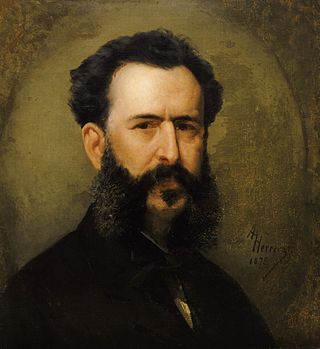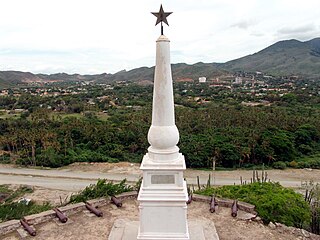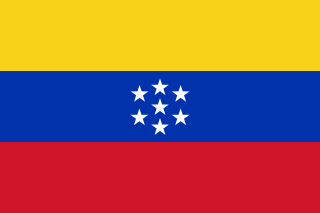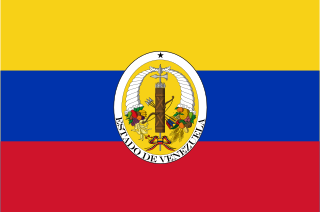
José Antonio Páez Herrera was a Venezuelan leader who fought against the Spanish Crown for Simón Bolívar during the Venezuelan War of Independence. He later led Venezuela's independence from Gran Colombia.

Valencia is the capital city of Carabobo State and the third-largest city in Venezuela.

Antonio Leocadio Guzmán Blanco was a Venezuelan military leader, statesman, diplomat and politician. He was the president of Venezuela for three separate terms, from 1870 until 1877, from 1879 until 1884, and from 1886 until 1887 and General during the Venezuelan Federal War.

The Palacio de Miraflores is the official residence of the President of Venezuela. It is located on Urdaneta Avenue, Libertador Bolivarian Municipality in Caracas.

The Battle of Carabobo, on 24 June 1821, was fought between independence fighters, led by Venezuelan General Simón Bolívar, and the Royalist forces, led by Spanish Field Marshal Miguel de la Torre. Bolívar's decisive victory at Carabobo led to the independence of Venezuela and establishment of the Republic of Gran Colombia.

Julián Castro Contreras was a Venezuelan military officer and the president of Venezuela between 1858 and 1859.

Ezequiel Zamora was a Venezuelan soldier and leader of the Federalists in the Federal War (Guerra Federal) of 1859–1863.

Martín Tovar y Tovar was a Venezuelan painter, best known for his portraits and historical scenes.
Venezuelan literature is the literature written by Venezuelans or in Venezuela, ranging from indigenous pre-Hispanic myths to oral or written works in Spanish or other languages. The origins of Venezuelan written literature are usually held to date back to the documents written by the first Spanish colonizers, its date of birth being sometimes set at August 31, 1498, when Christopher Columbus called the Venezuelan territory in his Diaries "Tierra de gracia".

The National Pantheon of Venezuela is a final resting place for national heroes. The Pantheon was created in the 1870s on the site of the ruined Santísima Trinidad church from 1744 on the northern edge of the old town of Caracas, Venezuela.

Eduardo Blanco (1838–1912), Venezuelan writer and politician, was aide-de-camp to General José Antonio Páez, independence hero and first president of Venezuela after the breakup of Gran Colombia in 1830.

The Federal War — also known as the Great War or the Five Year War — was a civil war (1859–1863) in Venezuela between the Conservative Party and the Liberal Party over the monopoly the Conservatives held over government positions and land ownership, and their intransigence in granting any reforms. This drove the Liberals – known as the Federalists – to look for greater autonomy for the provinces: a new federalism for Venezuela, as it were. It was the biggest and bloodiest civil war that Venezuela had since its independence from Spain on 5 July 1811. Around a hundred thousand people died in the violence of the war, or from hunger or disease, in a country with a population of just over a million people.

Pedro Camejo, also known as Negro Primero, was a Venezuelan soldier that fought with the Royal Army and later with the Independence Army during the Venezuelan War of Independence, reaching the rank of lieutenant. The nickname Negro Primero was inspired by his bravery and skill in handling spears, and because he was always in the first line of attack on the battlefield. It is also attributed to his having been the only black officer in the army of Simón Bolívar.
Following the Venezuelan War of Independence, Venezuela initially won independence from the Spanish Empire as part of Gran Colombia. Internal tensions led to the dissolution of Gran Colombia in 1830/31, with Venezuela declaring independence in 1811. For the rest of the nineteenth century, independent Venezuela saw a range of caudillos (strongmen) compete for power. Leading political figures included José Antonio Páez, Antonio Guzmán Blanco and Cipriano Castro.

The Treaty of Coche was an agreement that formally established the end of the Federal War in Venezuela.

The Battle of Matasiete was a battle in the Venezuelan War of Independence that took place on 31 July 1817 near the city of La Asunción on Isla Margarita in Venezuela. It was fought between pro-independence Republican revolutionaries led by Francisco Esteban Gómez and Spanish Royalist forces under the command of Pablo Morillo. The outcome was a Spanish defeat.

The battle of La Victoria took place during the Venezuelan War of Independence when Royalist forces under José Tomás Boves tried to take the city of La Victoria, held by General José Félix Ribas.

The United States of Venezuela was the official name of Venezuela, adopted in its 1864 constitution under the Juan Crisóstomo Falcón government. This remained the official name until 1953, when the constitution of that year renamed it the Republic of Venezuela. In 1999 under newly elected president Hugo Chávez and his modification to the Constitution, Venezuela's official name became the Bolivarian Republic of Venezuela.

The State of Venezuela was the official name of Venezuela adopted by the constitution of 1830, during the government of José Antonio Páez. The name was maintained until 1856 when in the constitution promulgated in that year it changes the official name of the country to Republic of Venezuela. In the Constitution of 1864, the United States of Venezuela was established.
The Venezuelan civil wars were a long series of conflicts that devastated the country during most of the 19th century.


















